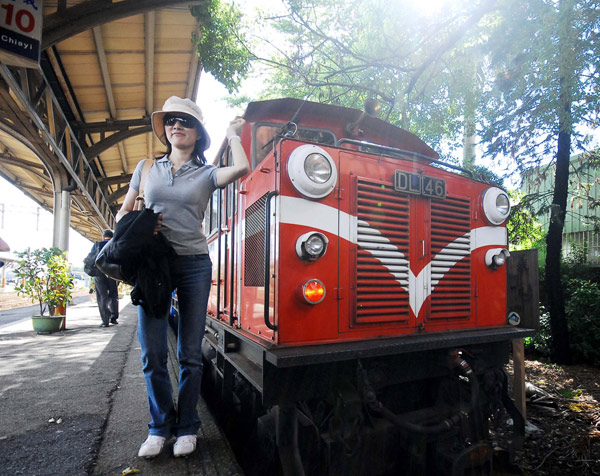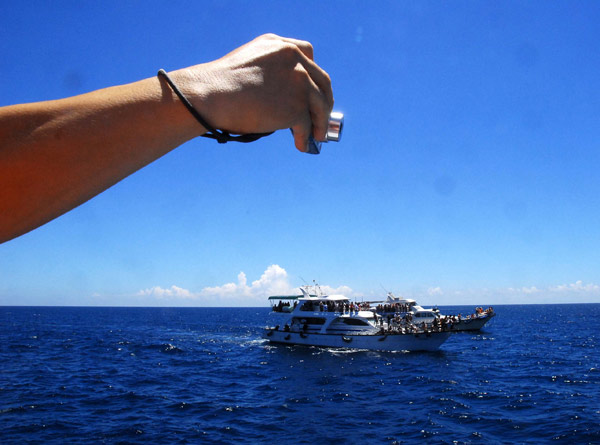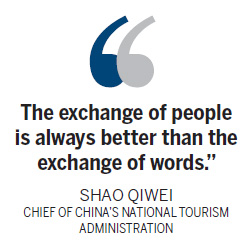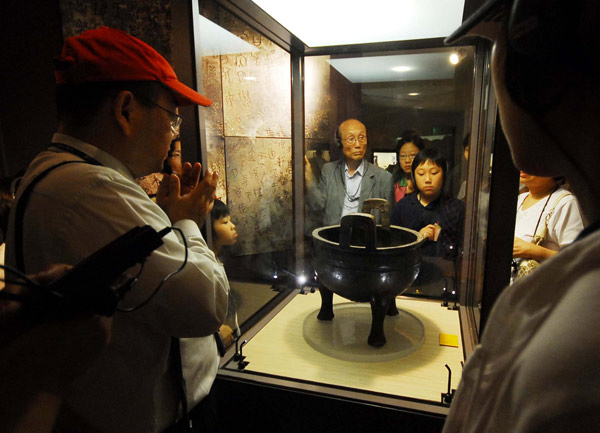Taiwan
Touch of individuality for visitors to Taiwan
By Yu Ran in Shanghai, and Duan Yan and Zhang Yuchen in Beijing (China Daily)
Updated: 2011-06-28 08:20
 |
Large Medium Small |
When Shanghai Airlines flight FM 801 lands on Tuesday morning at Taipei Songshan Airport, some of its passengers will be the first mainland tourists to fly directly, on individual travel arrangements, to Taiwan.
Other tourists, on the same status, will fly to Taiwan from Beijing and Xiamen in Fujian province and about 150 people from Xiamen will take a one-hour ferry ride to Jinmen.
|
 Chinese mainland tourists enjoy the sightseeing in Taiwan, some from a special train that wends its way over Ali Mountain. [Provided to China Daily] |
"We're lucky to have our clients in the first group of individual tourists landing in Taipei," said Cao Lu, operator of the Taiwan tours department for Shanghai Airlines Tours. "We also provide them with return tickets and hotel reservations."
These tourists can even choose their own accommodation, once there, if they wish.
Before Tuesday, tourists from the Chinese mainland were only allowed to visit Taiwan in group packages, following planned and guided tour routes arranged by 33 authorized travel agencies in Beijing, Shanghai and Xiamen. Up to July 2008 they had to fly to other countries or regions before landing on the island.
Under this pilot program, up to 500 individual and 4,000 group tourists from the mainland will be allowed in each day. Individuals can stay for up to 15 days.
|
 A cruise on the Pacific Ocean gives visitors a view of Taiwan in its watery setting. [Provided to China Daily] |
"The exchange of people is always better than the exchange of words," Shao Qiwei, chief of China's National Tourism Administration and of the Cross-Strait Tourism Exchange Association, said June 21 during an interview with CCTV.
There will be an exchange of money as well. Since 2008, mainland tourists traveling to Taiwan in groups totaled 2.34 million, and they injected an estimated NT$119.7 billion (US$4.1 billion) into the economy, said Lai Shin-yuan, the island's mainland affairs chief.

The individual travel program is expected to bring in an additional NT$9 billion to NT$19.5 billion.
The two sides of the Strait have agreed to increase the number of flights each week from 370 to 558. Travel agents expect ticket prices to decline as airlines seek to attract more individual customers. Current airfares run about 2,700 yuan ($416) plus tax for Beijing flights and at least 3,000 yuan for direct flights from Shanghai.
Taiwan's government announced the program in May 2009, but the start date wasn't set until three weeks ago. No time frame for the duration of the pilot program has been announced.
Times change
Xing Jingtian, a 60-year-old retired naval officer, and 20 other retirees from Beijing spent eight days traveling in Taiwan in March 2007. They arrived via the Philippines. At that time, Xing and others in their group needed permission for a guide-free day so some of the elders could visit relatives and friends.
People who have visited Taiwan before see the opening up for individual tourists as an opportunity to know Taiwan better.
|
 A bath in a hot spring soothes any aches from an overdose of walking. [Provided to China Daily] |
"I definitely will go to Taiwan again in the near future as I don't think that the previous five-day trip was enough for me to see the natural scenery and taste the delicious food over there," said Xiao Tong, 27, a white-collar worker in Shanghai. She took a group trip with her mother last month to attend a wedding in Hsinchu, in northwest Taiwan.
Xiao said she prefers to travel independently. She doesn't want to go to crowded tourist attractions but instead prefers to experience the local life by interacting with residents.
Safety, security
Many Taiwan residents working in the industry believe there is great potential for the development of tourism by mainland Chinese. Last year, the number of mainland tourists exceeded those from Japan for the first time.
"We started preparing to welcome the first group of individual tourists from the Chinese mainland at the beginning of this year," said Huang Te-chen, general manager of China Travel Services (Taiwan).
|
 The National Palace Museum in Taipei is filled with pottery and other artifacts of Chinese culture. A current exhibit reunites the two pieces of "Dwelling in the Fuchun Mountains", the masterpiece by Huang Gongwang (1269-1354). [Provided to China Daily] |
She said the company has set up a 24-hour hotline for its customers to call if they need assistance, and will distribute packets including detailed information booklets, guides, maps and souvenirs. It also plans to offer options such as two- or three-day trips to destinations such as mountainous Hualien county.
Huang's and other agencies also are providing such customary services as discounts on admission fees for a few attractions, hotel booking, a public transportation package and car rental.
Transportation and security are key concerns, especially at tourist sites that haven't prepared for the increased flow of people from China's mainland, said Lao Yibo, a travel expert from Guangzhou.
In late April, a small train overturned on Taiwan's Ali Mountain area, killing five tourists from the mainland and seriously injuring at least 100 passengers. Other accidents have occurred on the island as well.
Lao suggested that visitor limits be imposed at sites where long-used facilities haven't been updated. Chou Yu-ming, a retired businessman in Taiwan, had another take on limits:
"I noticed that most of those accidents occurred in tourist sites because the facilities were crowded with too many Chinese mainland tourists, who ignored the limit load of people the places can handle," he said.
"We have a mixed feeling of excitement and fear," Chou said. "We really want to improve friendship between the two sides but we also worry about certain bad behaviors will damage the social security here."
Even so, Chou said most residents are willing to welcome people from the mainland in the way that Hong Kong and Macao did after they returned to China. He said they also are anticipating some joint business ventures in the future.
For the local merchants, the pilot program opens up business opportunities. "I'm quite pleased that I'm going to sell my self-designed clothes to the mainland tourists, who will help me earn a much wider reputation," said Yang Ya-huei, an owner and designer with a clothes shop in Taipei.
'A good sign'
In general, experts suggest that improved cooperation between the two sides should be encouraged as a long-term goal.
"The launch of the individual mainland tourist program is a good sign of the development between the Chinese mainland and Taiwan, sharing in culture and business opportunities," said Yan Anlin, director of the Institute for Taiwan, Hong Kong & Macao Studies at Shanghai Institutes for International Studies.
Yan said individual travel also will give Taiwan residents and mainland tourists from the participating cities a chance to know and understand one another's traditions and life habits.
Luo Cuiming, 26, who lives in Beijing but is from Zhejiang province, wonders when the program will be extended to other provinces so she can apply. She said she wants to be able to travel in the island with her boyfriend, a photographer from Taiwan who is now working in Beijing.
"We were planning a trip to Taiwan anyway, and the individual travel program would make things much easier for us to visit his family in Taipei."
Groups, discounts
Meanwhile, travel agencies in the three participating mainland cities are trying to ensure that individuals have safe and convenient trips to Taiwan, but they are not giving up on the group tourist market.
Liu Di, operation director of Beijing-based China Comfort Travel, expects the total number of tourists to increase even as "self-help tourism" starts.
"In a tourist group we organized before, there were many middle-aged or elderly people," Liu said. "Now, more white-collar workers or young people who love and have abundant knowledge of self-help tourism prefer individual trips."
Ticket discounts are one tool that agencies such as Comfort plan to use to expand their clientele. Residents of Xiamen have a built-in discount option for travel to Taiwan: a flight or lower cost ferry.
A ferry ticket costs about 160 yuan, said Yang Fanggen, deputy director of Xiamen Municipal Tourism Bureau. Airfare runs about 1,000 yuan, plus tax.
Key dates
July 18, 2008: Taiwan lifts its 21-year ban on direct entry by mainland Chinese. It allows mainland residents from 13 selected provinces and cities to travel around Taiwan in scheduled groups. The maximum number of tourists is 300 a day.
January 2009: The minimum number of mainland residents in a single travel group is increased from five to 10. The maximum time of travel is expanded from 10 days to 15.
July 18, 2010: Taiwan opens the door to more mainland residents, allowing visitors from 31 provinces and cities.
June 28, 2011: Travel in Taiwan by Chinese mainland residents opens up to individuals. The daily limit is 500 independent travelers and 4,000 group tourists.
Some attractions are still not open to individual tourists; group visits must be arranged through a certified travel agency. One is Taipei 101, the landmark skyscraper that was the world's tallest building from 2004 to 2010. Another is Ali Mountain, the general name given to 18 mountains famous for sights including Ali Mountain Forest Railway and the Grand Sea of Clouds.
Chen Xin in Xiamen contributed to this report.
| 分享按钮 |